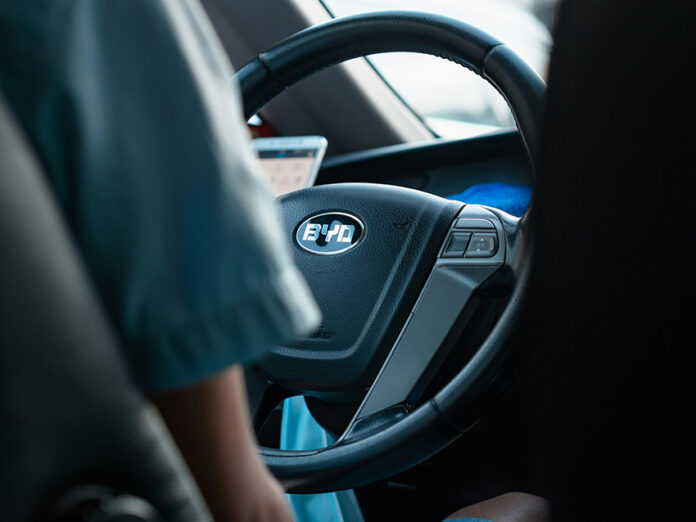Mexico’s tariff on cars imported from China and some other Asian countries will increase to 50% if President Claudia Sheinbaum’s tariff plan is approved by Congress.
Sheinbaum sent a legislative proposal to the lower house of Congress on Tuesday that aims to modify the Law on General Import and Export Taxes so that tariffs as high as 50% can be imposed on a wide range of imports from countries with which Mexico doesn’t have a free trade agreement.

The reform bill will almost certainly be approved as the ruling Morena party and its allies dominate both houses of Congress.
At an event at the Felipe Ángeles International Airport in México state on Wednesday, Economy Minister Marcelo Ebrard said that Mexico would increase the tariff on Chinese cars to the maximum level permitted by the World Trade Organization.
“They already have a tariff. What we’re going to do is raise it to the maximum allowed,” he said, referring to an existing 20% duty on cars made in China and other countries with which Mexico doesn’t have a free trade agreement, such as South Korea and India.
“… We’re going to take it higher, [to the level] the World Trade Organization allows us, which is up to 50%. Why? Because the prices at which they’re arriving to Mexico are below what we call reference prices,” Ebrard said.
“I’m going to explain that a little bit. On each product you have a reference price. When a product arrives to your country below the reference price, if it’s just one product, you do an anti-dumping investigation. A single product. But if they are a lot [of products], what do you do? You modify your tariff because if you don’t the national industry is at a disadvantage. So, for that reason, we’re taking that measure,” he said.
Ebrard said that the “main objective” of Sheinbaum’s tariff plan — which seeks to impose new tariffs on around 1,400 different products including some auto parts — is to “protect already established jobs.”
He also said it is aimed at “protecting Mexico’s strategic industries.”
“The Mexican automotive industry is 23% of national manufacturing. So we have to protect it. One of the ways to protect it is to increase the tariffs that these light vehicles pay,” Ebrard said.
Chinese cars have become very popular in Mexico
Sales in Mexico of vehicles made by Chinese automakers such as BYD — the world’s largest electric vehicle manufacturer — and Chirey have increased significantly in recent years. In fact, Mexico has become the top export market for Chinese vehicles.
Mexico also imports cars made in China by U.S. automakers such as General Motors and Ford.
Analysis: Chinese cars pour in to Mexico, rattling the USMCA
In 2024, more than 20% of new light vehicles purchased in Mexico were made in China, according to data from the national statistics agency INEGI. JAC, in a joint venture with a Mexican company, is the only Chinese automaker that currently makes cars in Mexico.
In addition to cars made in China, vehicles manufactured in countries such as South Korea and India will face a 50% duty when entering Mexico if Sheinbaum’s tariff proposal is approved by Congress. Cars made in Japan and Europe, which have free trade agreements with Mexico, would not be subject to the 50% tariff. Cars made in the United States and Canada can enter Mexico tariff-free thanks to the USMCA free trade pact, even as the U.S. collects tariffs on Mexican vehicles.
Gabriela Siller, director of economic analysis at Banco Base, said on X that demand for Chinese cars in Mexico will increase in the short term due to the announcement of the 50% tariff, “which will increase their price.”
In a separate post, she wrote, “The tariffs on imports from countries with which Mexico doesn’t have a trade agreement have two objectives: 1) greater tax collection and 2) to get on well with [Donald] Trump.”
Increasing tariffs on China could help Mexico in its negotiations with the United States and Canada during next year’s review of the USMCA.
Still, Jorge Guajardo, a former Mexican ambassador to China who now works as an advisor on global risk, asserted that Sheinbaum’s proposed tariffs are not motivated by a desire to appease the United States.

“These tariffs are in response to Mexican industry asking for them,” he wrote on LinkedIn.
“They have nothing to do with the U.S. It’s weird, but sometimes countries actually act in their own self interest. Who knew?”
‘A drastic change for the vehicle trade’
Guillermo Rosales, president of the Mexican Association of Automotive Distributors, said that the tariff decision by the Sheinbaum administration “represents a drastic change for the vehicle trade” in Mexico.
“As available inventories are depleted, prices would have to be adjusted. Competition in the domestic market will be limited, and consumers will have less choice,” he said.
“… The cost of purchasing electrified vehicles, plug-ins, hybrids and pure electrics will also rise,” Rosales said.
Citing analysts, the South China Morning Post reported Thursday that “Chinese carmakers will likely feel the sting of Mexico’s anticipated 50 per cent tariff on cars imported from Asia, but their competitive prices and global operations may offset some of the pain.”
“Chinese car prices are so competitive that even after taking into account the tariff increase, certain brands and models, especially the most affordable ones, are still profitable,” said James Chin, a professor of Asian Studies at the University of Tasmania in Australia.
By Mexico News Daily chief staff writer Peter Davies ([email protected])
